目录表
和慈善一样,可持续发展始于家庭.
作为一个致力于创新的非营利组织, practical environmental solutions and the responsible use of resources, the Union of Concerned Scientists strives to minimize its carbon footprint.
可持续的做法
Composed of members of every program at UCS, our Sustainability Task Force identifies and implements strategies to reduce our environmental impact. The task force harnesses the expertise of our scientists and experts, 并通知所有UCS决策.
项目包括:
- 减少全球变暖排放: Measuring, managing, and setting goals to reduce the organization’s carbon footprint;
- 创建可持续发展文化: Providing all UCS employees with the resources to make personal and organizational changes;
- 言出必行: Putting recommendations put forth by UCS experts in our publications into practice;
- 作为模特: Publicizing our work, and partnering in the development of industry best practices.
The task force also works on a wide range of day-to-day sustainability efforts within UCS, including recycling and composting at 我们的办公室, organizing community-supported agriculture deliveries to our Cambridge, MA, 和华盛顿, D.C., offices, and holding annual Bike-to-Work Month activities.
我们的环保办公室
Solar-powered, energy-efficient, and easily accessible by bike, on foot, and from public transit, 我们的办公室 are the result of thoughtful planning and green design.
撤资
In 2013, UCS discovered that some our investments included small holdings in fossil fuel companies. Although UCS did not directly invest in the companies, it’s important to us that our investment funds fully represent our organizational values. Once we learned about this, our board took steps to remove our funds from these holdings.
今天, UCS has achieved nearly complete divestment from fossil fuel companies, with no material change in risk or return objectives: Our stock holdings are now more than 98 percent fossil fuel–free.
可持续发展报告
UCS periodically conducts a rigorous analysis of its sustainability efforts, with a focus on measuring the carbon emissions generated by the organization's internal operations. The results provide a critical tool to manage and continually improve our operational carbon footprint.


